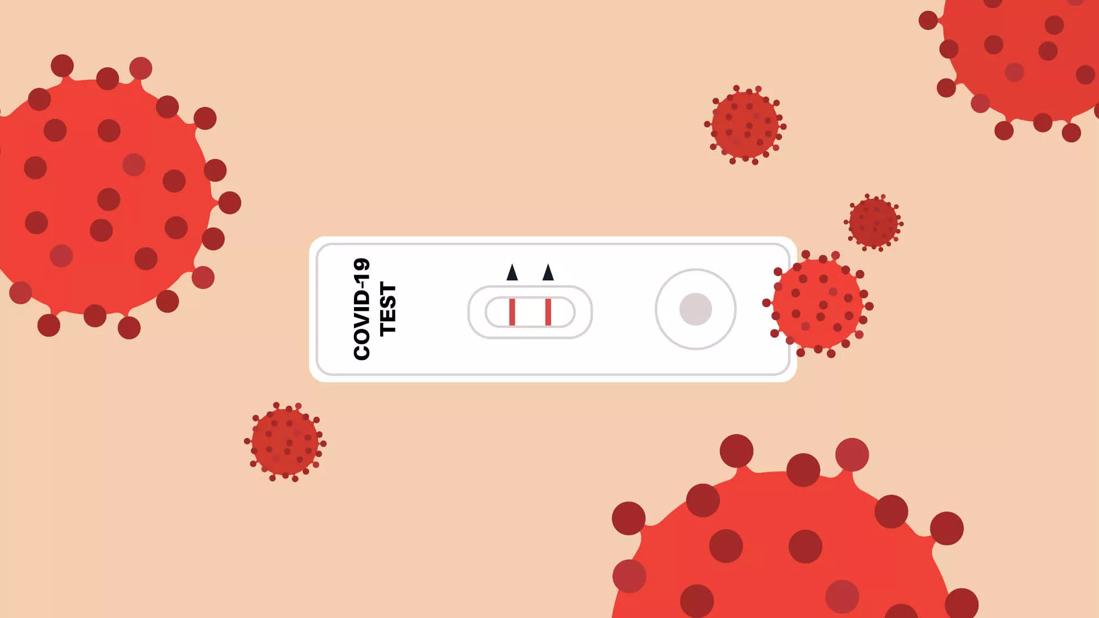The duration varies, but symptoms can linger for a few days up to a couple weeks or more

Image content: This image is available to view online.
View image online (https://assets.clevelandclinic.org/transform/7f52c8d6-d76c-41e2-b113-dfdf0379572f/Breakthrough-COVID-Test-1322732862-967x544-1_jpg)
positive COVID test with COVID virus molecules floating around it
Many people have chosen vaccination against COVID-19. As with other respiratory viruses, updated vaccines are offered periodically. But even if you’re vaccinated, you can still get sick.
Advertisement
Cleveland Clinic is a non-profit academic medical center. Advertising on our site helps support our mission. We do not endorse non-Cleveland Clinic products or services. Policy
As with cases of the flu, there’s still a chance the virus that causes COVID-19 could break through your immune system’s bolstered defenses. When breakthrough cases like this happen, the virus can get you sick, or at the very least, cause you to be contagious until the virus wears off.
Breakthrough cases of COVID-19 are actually more common than you might think, but they’re far less dangerous than if you were infected with the virus while unvaccinated. Infectious disease expert Steven Gordon, MD, explains why you can get COVID-19 after you’re vaccinated, and how a post-vaccine infection will likely affect you in different ways.
A breakthrough case is when a person tests positive for COVID-19 at least two weeks after becoming fully vaccinated (which includes receiving the latest COVID-19 vaccine).
Breakthrough cases are common occurrences, and they were always expected in some fashion, as we see it happen with other viruses like the flu. You can get infected from any COVID-19 variant that’s circulating, even those you’ve been vaccinated against. You can also get infected more than once by the same or different variants. But the most important thing, despite having been infected, is knowing that the likelihood of your symptoms being severe is greatly reduced compared to if you weren’t vaccinated.
Advertisement
It’s common for someone to still get COVID-19 even though they’ve been vaccinated. But it’s difficult to estimate exactly how many people get infected after having the vaccine because most cases tend to be asymptomatic (meaning you experience no symptoms) or mild. And people are less likely to get tested for COVID-19 if they’re not exhibiting any symptoms or if it seems like the average common cold.
If you’ve been fully vaccinated for COVID-19, you’ll likely experience the same typical symptoms associated with unvaccinated COVID-19 cases — but the symptoms you experience will likely be few, less severe and resolve at a much faster rate. Some of the symptoms you’ll possibly experience include:
“Many breakthrough cases are either asymptomatic or have symptoms that are far less severe than cases in unvaccinated patients,” Dr. Gordon notes. “The updated vaccines are intended to help reduce the risk of severe illness and may make infections easier to manage.”
Recovery time varies by person and variant. Many vaccinated people report symptoms lasting several days to about two weeks.
You can still spread COVID-19 even if you’re vaccinated, but the length of time you’re contagious is much shorter than if you skipped out on getting a vaccine.
Studies have found vaccinated people may have a shorter period of contagiousness than those who aren’t vaccinated, but the exact window can vary.
If you’ve been exposed or feel sick, check current guidance from your healthcare provider and local health authorities. Some people — especially older adults or those with health conditions — may choose added precautions (for example, a high-quality mask) in crowded indoor settings.
If you’re considering vaccination or a booster, discuss your age, health conditions, prior infections and timing with your healthcare provider. Many people — especially older adults or those with underlying conditions — choose vaccination to reduce the risk of severe illness, and some also opt for added precautions in crowded indoor spaces during surges.
Advertisement

Sign up for our Health Essentials emails for expert guidance on nutrition, fitness, sleep, skin care and more.
Learn more about our editorial process.
Advertisement
Chilblain-like skin lesions and rashes are mild (and rare) complications of many viral infections, not just COVID-19
Most can return to work or school when they’re symptom-free for 24 hours
Covering your mouth when you cough and staying home when you’re sick are a couple ways to help keep yourself and others COVID-free
This vital nutrient supports your health, but its role in COVID-19 prevention and treatment isn’t proven
Studies have shown promising results, but additional research is needed
Infection and inflammation can cause you to lose your voice and have other voice changes until you’re fully healed
A COVID-19 infection can bring on depression or anxiety months after physical symptoms go away
Just like the flu, COVID-19 continues to evolve every year with new and smarter variants
Although it could be used as a moisturizer, this new trend is not recommended
Communicating clear limits helps protect your time, energy and emotional well-being
High cholesterol can be genetic, but testing and treatment can lower your heart disease risk